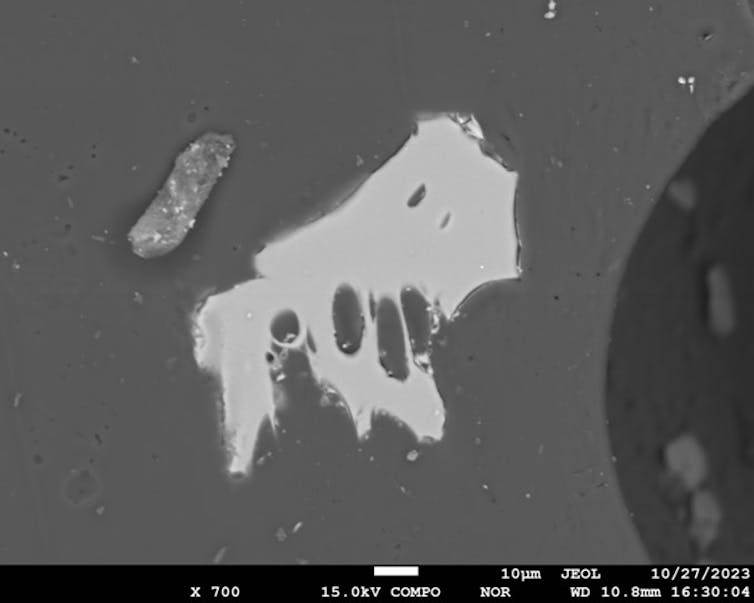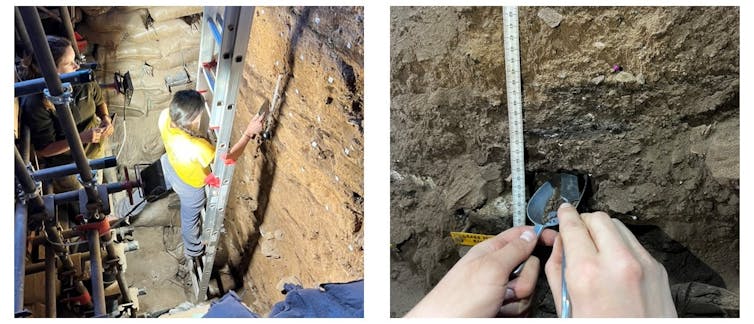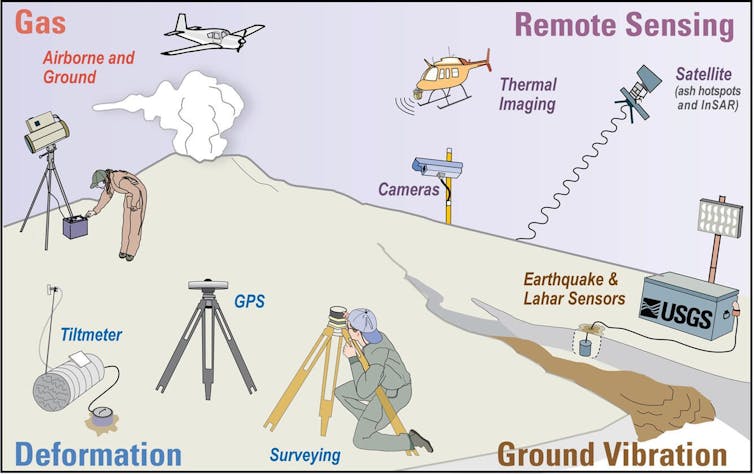In the event you had been fortunate 74,000 years in the past, you’d have survived the Toba supereruption, one of many largest catastrophic occasions that Earth has seen prior to now 2.5 million years.
Whereas the volcano is situated in what’s now Indonesia, dwelling organisms throughout your complete globe had been probably affected. As an archaeologist who specializes in studying volcanic eruptions of the previous, I usually take into consideration how unbelievable it’s that people survived this extinction-level occasion that was over 10,000 instances bigger than the 1980 Mount St. Helens eruption.
USGS Volcanic Hazards Program, CC BY
The Toba supereruption ejected 672 cubic miles (2,800 km³) of volcanic ash into the stratosphere, producing an infinite crater roughly 1,000 soccer fields in size (62 x 18 miles, or 100 x 30 kilometers). An eruption this dimension would have produced black skies blocking a lot of the daylight, probably inflicting years of world cooling. Nearer to the volcano, acid rain would have contaminated water provides, and thick layers of ash would have buried animals and vegetation.
With all these odds stacked in opposition to Homo sapiens as a species, how did we survive to piece collectively the story right this moment?
Survival amid the ashes
Human populations dwelling in shut proximity to the Toba volcano had been most likely fully worn out. Whether or not folks on different elements of the globe had been affected is a query that scientists are nonetheless investigating.
The Toba catastrophe hypothesis was one outstanding college of thought for a few years. It proposes that the Toba supereruption brought on a world cooling occasion that lasted as much as six years. Its results, based on the speculation, brought on human inhabitants sizes to plummet to fewer than 10,000 particular person folks dwelling on Earth.
This state of affairs is supported by genetic evidence discovered within the genomes of individuals alive right this moment. Our DNA means that fashionable people unfold into separate areas round 100,000 years in the past after which shortly after that skilled what scientists name a genetic bottleneck: an occasion, comparable to a pure catastrophe or illness outbreak, that results in a big decline in inhabitants sizes. These calamities drastically scale back the genetic variety in a bunch.
Whether or not this obvious discount in human inhabitants dimension resulted from the Toba supereruption or another issue is closely debated. As scientists accumulate extra knowledge from local weather, environmental and archaeological data, we are able to start to grasp what situations had been most necessary for human survival.
Easy methods to examine a supereruption’s influence
To piece collectively what occurred 74,000 years in the past, scientists have one direct line of proof they’ll use: the rock and ash ejected from the volcanic eruption itself. This materials is known as tephra. Scientists can hint the layers of tephra throughout the panorama each visually and chemically.

Jayde N. Hirniak
Microscopic volcanic glass referred to as cryptotephra travels the farthest, making it necessary for understanding the true extent of an eruption. As a result of cryptotephra shouldn’t be seen to the bare eye, it may be actually difficult to establish. Researchers like me rigorously separate out the tiny glass shards by sifting by the dust and utilizing a micromanipulator, a software that may choose up and transfer microscopic grains. This course of can really feel like on the lookout for a needle in a haystack and might take months to finish for one web site.
Each volcanic eruption has a novel chemistry, which scientists can use to find out which eruption a selected pattern of volcanic materials originated from. As an illustration, tephra from one eruption may need extra iron in it in comparison with tephra from one other eruption. With this data, we are able to start to grasp how massive previous eruptions had been and who they instantly affected.
After I work within the area, I search for cryptotephra that settled on archaeological websites – locations with traces of previous human exercise comparable to instruments, artwork and even buried stays. I accumulate samples from areas of the positioning which were excavated and convey them again to the lab to extract the microscopic volcanic glass out of the dust. Then I chemically analyze the glass to determine the volcanic fingerprint.

Jayde N. Hirniak
However even when I decide {that a} sure pattern from an archaeological web site is from the Toba supereruption, what does that reveal about whether or not folks survived the blast?
As soon as we establish a tephra or cryptotephra layer, the following step is to look intently at what’s preserved within the archaeological document earlier than and after that eruption. In some instances, folks change their conduct after an eruption, comparable to utilizing a brand new stone software expertise or consuming one thing totally different. Generally, folks even abandon a web site, leaving no hint of human exercise after a catastrophic occasion.
Finding out volcanic deposits on archaeological websites fills in just one piece of the puzzle, although. Environmental and local weather data protect info on how the native vegetation or world temperatures modified on the time of the eruption. This info helps scientists perceive why folks made the modifications they did.
What does the archaeological proof reveal?
Given the scale and depth of the Toba supereruption, it nearly appears inevitable that people throughout the globe would have suffered immensely. Nonetheless, most archaeological websites inform a narrative of resilience.
In locations comparable to South Africa, people not solely survived this catastrophic occasion however thrived. At archaeological site Pinnacle Point 5-6, proof of cryptotephra from Toba reveals that people occupied the positioning earlier than, throughout and after the eruption. Actually, human exercise elevated and new technological innovations appeared shortly after, demonstrating people’ adaptability.
This miraculous end result was not restricted to South Africa. Related proof can also be preserved at archaeological web site Shinfa-Metema 1 in the lowlands of Ethiopia, the place cryptotephra from Toba was current in layers that additionally protect human exercise.
Right here, previous people tailored to modifications within the native atmosphere by following seasonal rivers and fishing in small, shallow waterholes current throughout lengthy dry seasons. Across the time of the Toba supereruption, people on this area additionally adopted bow-and-arrow expertise. This behavioral flexibility allowed folks to outlive the extreme arid situations and different potential results of the Toba supereruption.
Via the years, archaeologists have discovered related outcomes at many different websites in Indonesia, India and China. Because the proof accumulates, it seems that folks had been capable of survive and proceed to be productive after Toba blew its stack. This implies that this eruption won’t have been the principle reason behind the inhabitants bottleneck initially recommended within the Toba catastrophe hypothesis.
Whereas Toba won’t assist scientists perceive what brought on historic human populations to plummet to 10,000 people, it does assist us perceive how people have tailored to catastrophic occasions prior to now and what meaning for our future.
What might a future catastrophe imply?
The excellent news is that we’re much more ready now than folks had been 74,000 years in the past, and even then, they had been capable of adapt and discover new options within the wake of devastating occasions. As we speak, packages such because the USGS Volcanic Hazards Program and the Global Volcanism Program concentrate on preparation by monitoring lively volcanoes by a wide range of strategies. Actually, you may try what volcanoes are currently erupting at any time.

Lisa Faust, USGS, CC BY
Apart from our elevated preparedness, people are outlined by our adaptability to nearly any situation, even cataclysmic occasions. By finding out the influence of volcanic eruptions within the archaeological document, we are able to higher perceive what situations had been key for human survival prior to now and apply these classes to the long run.
Jayde N. Hirniak, Ph.D. Candidate in Anthropology, Institute of Human Origins, Arizona State University. This text is republished from The Conversation underneath a Artistic Commons license. Learn the original article.![]()
Trending Merchandise

KEDIERS White PC CASE ATX 5 PWM ARG...

Thermaltake Tower 500 Vertical Mid-...

ASUS TUF Gaming 27″ 1080P Mon...

Cooler Master Q300L V2 Micro-ATX To...

LG 27MP400-B 27 Inch Monitor Full H...

NETGEAR Nighthawk 6-Stream Dual-Ban...

HP 15.6″ Touchscreen Laptop c...

Sceptre 4K IPS 27″ 3840 x 216...

Acer KC242Y Hbi 23.8″ Full HD...




